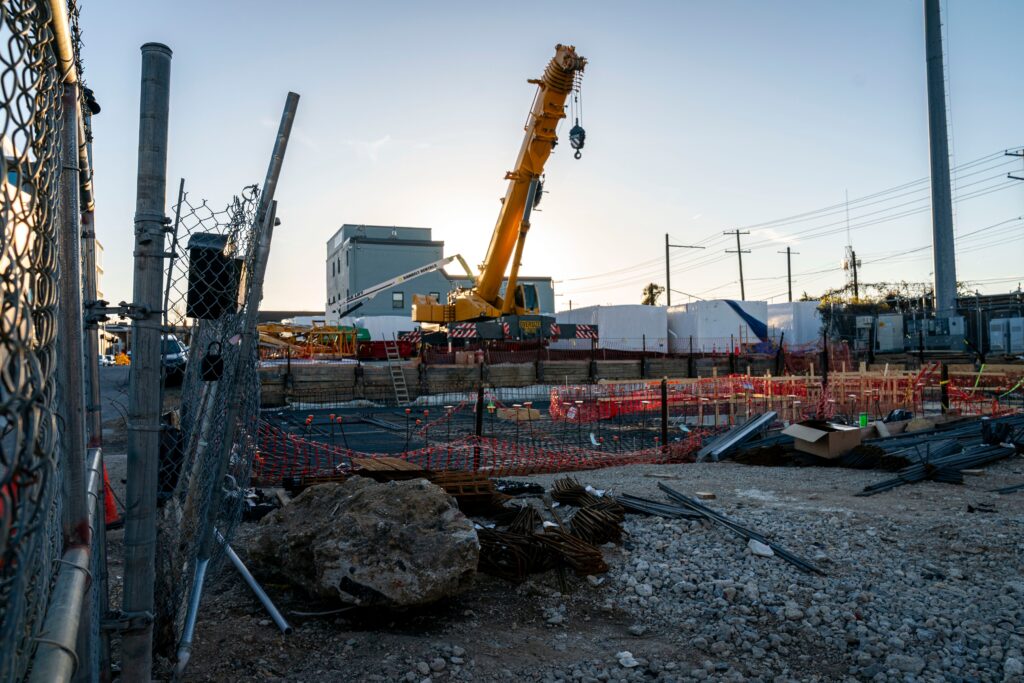When D.C.’s only halfway house for men closed in 2020 after years of complaints over its safety and lack of basic services, advocates and former inmates saw it as a win for those on the verge of release from prison. Back then, federal prison officials said its replacement would be up and running within a matter of months.
More than five years later, that long-promised D.C. halfway house remains a construction site, little more than a concrete foundation and a trail of blown deadlines.
Many D.C. men returning from prison are instead sent to halfway houses in Baltimore and Delaware, isolated from their communities and far from the reentry programs meant to help them prepare to go home.
CORE DC, the company that won the $64 million contract to build and operate the halfway house, blames the delays on high construction costs and groundwater at the site, as well as political and bureaucratic holdups.
The company has been paid millions from the Federal Bureau of Prisons to run home confinement services while the city lacks a permanent facility, but hasn’t received any public money for the incomplete construction. It says the project’s completion is months away — a pledge it has made for years.
Many D.C. prison rights advocates, elected officials and former inmates are skeptical of the company, which in recent years has faced lawsuits for unpaid debts and scrutiny from the IRS for unpaid taxes.
“They are not being transparent, they are blowing past deadline after deadline to the point where their deadlines don’t mean anything to me or the community anymore,” said D.C. Council member Robert C. White Jr. (D-At Large). “I don’t believe any of the promises they make at this point.”
A spokesperson for CORE DC said the halfway house “is currently under construction and is on schedule for completion in February 2026.”
In the meantime, sending D.C.’s returning prisoners so far away is a self-defeating recipe for bad outcomes, said Shelley Broderick, a law professor at the University of the District of Columbia and chair of the District Task Force on Jails and Justice. Without a halfway house in their hometown, returning prisoners must attempt to rebuild their lives without any of the foundations they left behind. She called the situation a “moral outrage.”
“It’s just huge, mountain-high barriers to their accessing the services and programs and jobs they need to be successful,” Broderick said. “We’re not doing what we need to do to prevent the harms that returning citizens can bring to the city if they don’t get the treatment that they need.”
Ricardo Davis, who spent thirty years in and out of prison after being convicted of murder as a young man, remembered hearing for years that CORE DC’s halfway house was right around the corner. He had taken steps to turn his life around — stopped his drug use, went to therapy — and hoped for a fresh start in his hometown. But when he finally became eligible for transfer to a halfway house last year, he landed in Baltimore.
“The first thing on my mind was, ‘I’m not from Baltimore, why is they sending me up to Baltimore?’” said Davis, now back in D.C. “I have to acclimate myself back into society. I got to be here.”
A deal, then delays
The District at one time had at least nine halfway houses for men and women, operated by the city corrections department and private contractors. As they shut down over the years, due in part to funding cuts, several attempts to build new ones withered in the face of resistance from elected officials and crime-wary city residents.
Halfway houses have long been a feature of the federal prison system, allowing some inmates to finish their prison terms closer to home under supervision and with support to gradually reenter society. Stays can last up to a year.
By 2006, Hope Village in Southwest Washington was the city’s only halfway house for men. Operated under a Federal Bureau of Prisons contract, it often came under fire from city officials and advocates over poor conditions and failing to provide basic services to residents.
In 2018, the Bureau of Prisons announced a new halfway house would be built by CORE DC, a company formed by a group that had operated homeless shelters and halfway houses in New York City. The D.C. government has also contracted CORE DC to operate homeless shelters in the city, paying more than $34 million since 2020.
Local advocates and elected officials, including White, were instrumental in bringing the company to the city, believing it could provide the reentry services D.C.’s formerly incarcerated desperately needed.
“I put my neck on the line for them,” White said of CORE in a recent interview, “and I believed that they would do a good job.”
But the project was troubled from the start. Hope Village launched a legal battle over the contract, causing a two-year delay. The property owner of the original site in Ward 5 backed out. When CORE DC found a new site on Benning Road in Northeast Washington, resistance from local residents and elected officials delayed the project even further.
It wasn’t until 2022, two years after the halfway house was slated to be completed, that CORE DC received permits to begin construction. CORE DC CEO Jack Brown, in an op-ed in The Washington Post, blamed the delay on “not-in-my-backyard opposition.”
The Bureau of Prisons acknowledged in a contract filing that year that construction challenges would cause delays, but anticipated a June 2022 completion date.
The company announced repeated setbacks, each time citing construction issues. Advocates and officials who had initially supported CORE DC grew frustrated.
“No one is saying anything, really, about what the holdup is. And it has been ridiculously protracted delays,” said Broderick, the task force chair.
The delays have coincided with legal trouble for CORE DC. In the past two years, the organization has been accused in seven lawsuits of failing to pay business contracts. Judges have so far ordered CORE to pay more than $500,000. In one ongoing case, a company contracted by CORE DC to provide janitorial services at its properties is seeking $1.1 million in unpaid fees. And earlier this year, CORE DC had to pay the IRS nearly $1 million for unpaid taxes.
A CORE spokesperson said the company has repaid all outstanding debts and is in good financial standing.
Brown, the CEO, has also come under fire for the New York nonprofit he heads. A 2021 New York Times investigation accused Brown of enriching himself with public funds his New York nonprofit had received to run homeless shelters. Brown denied wrongdoing, but the city of New York later ended its contracts with the nonprofit.
A report by New York investigators last year found that Brown formed several for-profit companies to provide services to shelters run by his own nonprofit, receiving “significant compensation.” The report concluded that the self-dealing may have been improper transactions prohibited by state law.
CORE DC previously said its operations are separate from the New York nonprofit’s operations. Brown did not respond to requests for comment.
Lamont Carey, director of the Mayor’s Office of Returning Citizen Affairs, said the company recently assured him that construction was progressing, but it didn’t give him a “definite opening date.”
In February, the Bureau of Prisons announced it would solicit new bids for a D.C.-area halfway house. Asked to comment on the new contract, an agency spokesperson said CORE DC’s contract expires in 2027, and “the BOP identified a continued need” in the city. CORE DC has filed legal protests that have stalled the process.
A similar protest played out when a group linked to CORE’s leadership lost a contract for a halfway house in Hawaii. Documents from that case reveal CORE wasn’t selected in part because previous problems identified by federal prison officials raised “serious concerns regarding CORE’s ability to successfully perform the contract.”
Federal officials declined to say whether they were seeking to replace CORE DC with a different contractor.
Another company planning to open a small halfway house in D.C., HeRise Growth Center, planned to pursue the new BOP contract but it’s currently on hold, according to founder Andrane Gordon.
‘Broken Promises’
Since Hope Village’s closure, CORE DC has provided prerelease home confinement, earning more than $4.1 million in government funding while allowing some D.C. inmates to finish their sentences at home wearing ankle monitors. But many who would otherwise return to D.C. continue to be placed in the Baltimore halfway house.
The Washington Post spoke with nine former D.C. inmates who spent time at the Baltimore halfway house. They said the separation from D.C. and lack of support made it difficult to connect with reentry services in the District, and nearly impossible to secure a job there.
Several reported being told during their last years of incarceration — by lawyers, elected officials and fellow inmates — that the new D.C. halfway house would open in time for their release. Getting sent to Baltimore felt like a betrayal.
It was “just a whole bunch of broken promises,” said Darnell Keyes, who was released last year after nine months at the Baltimore facility.
The Baltimore halfway house, Volunteers of America Chesapeake, has also been overburdened by the influx. In 2022, federal prison officials reported that the Baltimore facility was full even after doubling its capacity to serve D.C. inmates and could not handle any more.
Men returning to D.C. after stints in prison now make up a third to half of the Baltimore halfway house population, according to inspection reports and inmate interviews. Multiple reports by D.C. inspectors noted that inmates there are more at risk of being sent back to prison because of the overcrowding.
“The Baltimore halfway house is … particularly bad for D.C. people,” said Pam Bailey, co-founder of the nonprofit More Than Our Crimes, which advocates for individuals in federal prison.
The threat of being sent back to prison hangs like a cloud over the former inmates, who spend their days rushing back and forth to D.C. by public transportation to attend job training courses or to apply for a replacement birth certificate or social security card, several recalled. Being late for any reason could result in a disciplinary infraction and, some feared, a potential cause for being sent back to prison.
“The stress and pressure that created for me was so much that I thought I was going to fall apart,” said Kenard Johnson, who spent eight months at the Baltimore halfway house before his release in July 2022.
Volunteers of America Chesapeake referred questions to the Bureau of Prisons.
Last month, CORE DC invited council members White and Wendell Felder (D-Ward 7) to tour the construction site. White said he was glad to finally see activity but still harbored doubts. Felder said through a spokesperson he was committed to working with CORE to ensure the project is completed. White remains less optimistic.
“Because this project is so delayed they have eroded my trust,” White said in a statement, “and nothing will change my skepticism until I see a building that D.C. residents returning home are living in.”
The post D.C.’s long-promised halfway house lacks walls, roof, completion date
appeared first on Washington Post.




